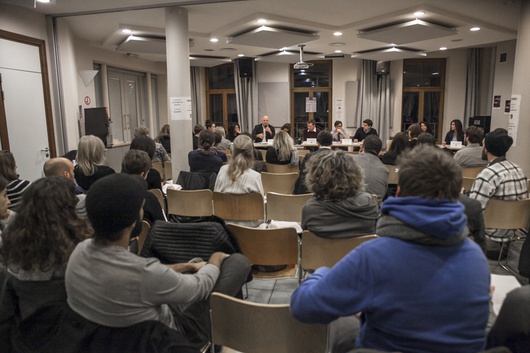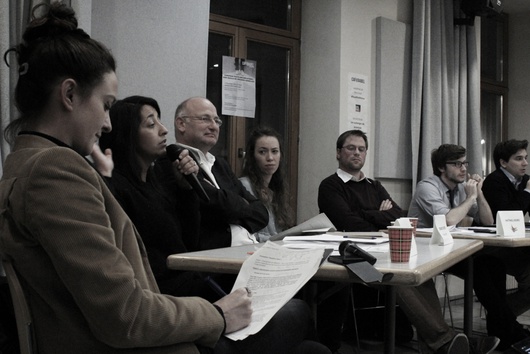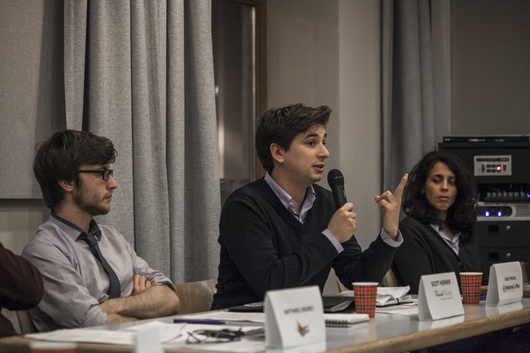
Cafebabel Brussels Debate: European Youth and Employment - How should we organize ourselves?
Published on
On the 2nd of December Cafebabel Brussels organized an evening debate on the topic of youth employment. The aim of the debate was to bring to light the steps that could be taken on a legislative level and on the level of civil society organizations to improve the situation. As well as to talk about what has already been done on both sides.
Especially after the financial crisis of 2008-09, the topic of unemployment has become a well-known concern. The situation in Europe is alarming. This must be recognized and solutions implemented by our legislators in order to adapt to the new conditions on the job market and in society.
The responses at the EU level
The speakers of the first part of the debate talked about the EU level responses to the issue.
 Bernard Conter, a political scientist working as a Research Officer at the Walloon Institute for Evaluation, Prospective and Statistics (IWEPS) pointed out that the source of this widespread unemployment throughout all age groups does not have its origin in the problems of the most recent financial crisis. This situation has been building up over decades. Governments’ role has transformed to favour enterprise development. Enterprises offering work can be very selective as they have a long queue of people waiting at their door. In addition, enterprises are able to influence the labor policy in their favour. For example, by offering non-remunerated traineeships instead of open-ended contracts. They can also easily choose to pay a salary below the minimum wage.
Bernard Conter, a political scientist working as a Research Officer at the Walloon Institute for Evaluation, Prospective and Statistics (IWEPS) pointed out that the source of this widespread unemployment throughout all age groups does not have its origin in the problems of the most recent financial crisis. This situation has been building up over decades. Governments’ role has transformed to favour enterprise development. Enterprises offering work can be very selective as they have a long queue of people waiting at their door. In addition, enterprises are able to influence the labor policy in their favour. For example, by offering non-remunerated traineeships instead of open-ended contracts. They can also easily choose to pay a salary below the minimum wage.
Mr Conter continued to explain that contrary to what people may have been lead to believe, enterprises are not the ones that create jobs. Instead, it is public procurement that creates jobs. The public’s need for something brings on government investments, restarts the economy and generates jobs in enterprises.
 MEP Karima Delli, who is a member of Europe Ecology – The Greens Party and is also on the European Parliament Committee on Employment and Social Affairs spoke of the lack of political will that she has experienced while working for the European Parliament since 2009. She feels that investments made into young people is the good debt that should be carried for the benefit of future generations. One of the biggest problems that she has been dealing with in France is the issue of unpaid and low quality traineeships. According to data a person accumulates around 10 traineeships before they are offered an open-ended contract. All of this pushes young people into a life in poverty.
MEP Karima Delli, who is a member of Europe Ecology – The Greens Party and is also on the European Parliament Committee on Employment and Social Affairs spoke of the lack of political will that she has experienced while working for the European Parliament since 2009. She feels that investments made into young people is the good debt that should be carried for the benefit of future generations. One of the biggest problems that she has been dealing with in France is the issue of unpaid and low quality traineeships. According to data a person accumulates around 10 traineeships before they are offered an open-ended contract. All of this pushes young people into a life in poverty.
The responses at the level of civil society
The second part of the debate was dedicated to youth organizations.
Matthieu Degrez from Conseil de la Jeunesse, representing the point of view of the Belgian French-speaking youth, added to previous discourse that many Belgian political parties continue to stress that there is a skill mismatch on the job market. With this they are stating that young people are personally responsible for not finding a job as they are not educated enough. This is incorrect and it shifts the blame onto an individual level while it is a problem of the whole society.
Régis Pradal, one of the founders of InternsGoPro, adds that we should be pushing our lawmakers to real action. The aim of InternsGoPro is to initiate change and have legislation follow it. Specific incentives are necessary for legislators to listen. The idea of InternsGoPro was to build a strong label that would be binding to employers who adopt it.
 Scott Horner, representing the organization Think Young, believes that if young people wish to be heard then they need to make sure they are heard by politicians through election results. The question of voting was provocative to the audience as it brought up two interesting points. Firstly, in Belgium people are obliged to vote, so it is actually necessary to do more than that to be involved in the political process. Secondly, people often ask themselves the question of who is there at all to vote for.
Scott Horner, representing the organization Think Young, believes that if young people wish to be heard then they need to make sure they are heard by politicians through election results. The question of voting was provocative to the audience as it brought up two interesting points. Firstly, in Belgium people are obliged to vote, so it is actually necessary to do more than that to be involved in the political process. Secondly, people often ask themselves the question of who is there at all to vote for.
It is clear to see from the debate that solutions are necessary on the level of society and on the level of the whole EU. Everyone agrees that there are not enough jobs. At the same time we must make sure that people have the education that corresponds to the needs of the market. We need to work on two fronts, to increase the marketable skills and at the same time creating job opportunities. One direct measure to create many jobs would be to decrease the working time. This would allow many more people to enter the job market. As it is true for any movement, to have a voice and an influence young people should organize, should find their peers, collaborate and find solutions themselves at the same time as pushing for change on the legislative level. If this does not happen, the labor rights of everyone, employed or unemployed, continue to be danger. As stated by Bernard Conter we cannot consider our reality now as a permanent situation and an eternal truth.
We need to do our part to make sure what we are experiencing now is not the case in the future.



